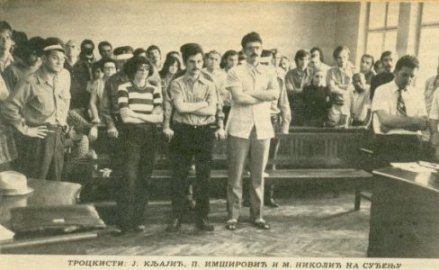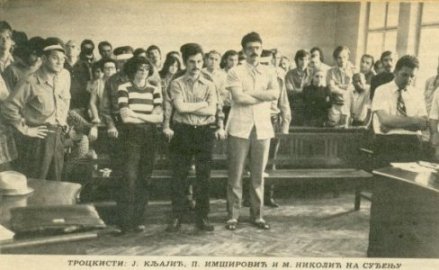
Izricanje presude 1972, Jelka Kljajič, Pavluško Imširović, Milan Nikolić
U ovom političkom autobiografskom tekstu autorka piše o svom viđenju šezdesetosmaškog studentsko-disidenstkog miljea u Beogradu u periodu posle pubune iz ’68, i opisuje državnu represiju kroz koju je prošla zbog pripadnosti ovom miljeu. Tekst je originalno objavljen u časopisu Republika, a ovde ga prenosimo u skraćenoj verziji.
Jelka Kljajić-Imširović
Disidenti
Zaoštravanje represije odlučujuće je uticalo, po mom mišljenju, da se unutar studentskog pokreta pojave i ideje, bolje reći razmišljanja, o mogućnostima i strategijama otpora na “duže staze”. U krugu ljudi u kojem sam se kretala (družila), uglavnom studenata, ali ne samo studenata, smatrali smo da su revolucionarna teorija društva i revolucionarna radnička partija dve bitne pretpostavke i istovremeno činioci transformacije savremenog represivnog klasnog društva u istinsko socijalističko društvo. O kolikom broju ljudi je reč? Po mom sećanju, a dopuštam da ono nije sasvim pouzdano, u tom krugu – koristim namerno ovaj termin, a ne, recimo, pojam grupa – nije bilo više od 20-ak ljudi.
Naša idejno-teorijska stanovišta temeljila su se na Marksovom delu i marksizmu, stvaralačkom marksizmu, kako se tada govorilo, tj. marksizmu bitno različitom od sovjetskog, dijamatskog “marksizma”. Razume se, postojale su i značajne razlike u shvatanjima, i oko nekih bitnih marksističkih sadržinskih pretpostavki, i oko pojedinih marksističkih teoretičara i revolucionara. Na primer, za mene su dela Roze Luksemburg bila relevantnija za razumevanje i vremena u kojem je ona živela i naše savremenosti nego dela Lava Trockog. Za Pavluška Imširovića ona je bila veoma značajna ličnost kao revolucionarka, ali ne i kao teoretičarka revolucije. U skladu sa onom Lenjinovom ocenom da je Roza “i pored svih svojih zabluda bila orao revolucije”.1

